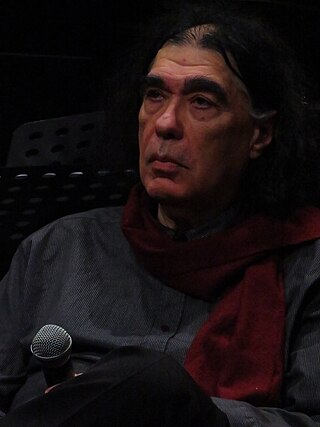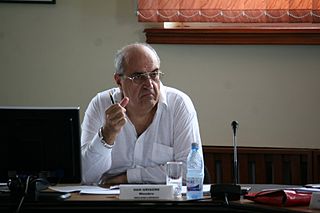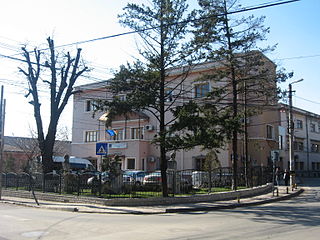Related Research Articles

Mihai Eminescu was a Romanian Romantic poet from Moldavia, novelist, and journalist, generally regarded as the most famous and influential Romanian poet. Eminescu was an active member of the Junimea literary society and worked as an editor for the newspaper Timpul, the official newspaper of the Conservative Party (1880–1918). His poetry was first published when he was 16 and he went to Vienna, Austria to study when he was 19. The poet's manuscripts, containing 46 volumes and approximately 14,000 pages, were offered by Titu Maiorescu as a gift to the Romanian Academy during the meeting that was held on 25 January 1902. Notable works include Luceafărul, Odă în metru antic, and the five Letters (Epistles/Satires). In his poems, he frequently used metaphysical, mythological and historical subjects.

Botoșani County is a county (județ) of Romania, in Western Moldavia, with the capital town at Botoșani.

George Enescu, known in France as Georges Enesco, was a Romanian composer, violinist, conductor and teacher and is regarded as one of the greatest musicians in Romanian history.

Botoșani is the capital city of Botoșani County, in the northern part of Moldavia, Romania. Today, it is best known as the birthplace of many celebrated Romanians, including Mihai Eminescu, Nicolae Iorga and Grigore Antipa.

Dimitrie Cuclin was a Romanian classical music composer, musicologist, philosopher, translator, and writer.

Iancu Dumitrescu is a Romanian avant-garde composer.

Eugen Doga is a Soviet composer of Moldovan descent.

Dan Grigore is a Romanian classical pianist. He is regarded as one of the great pianists of the twentieth century, as well as one of the four greatest Romanian pianists of all time.

The George Enescu National University of Arts is a public university in Iași, Romania, founded in 1860. It was named in honor of the composer George Enescu.

Violeta Dinescu is a Romanian composer, pianist and professor, living in Germany since 1982.

Liana Alexandra Septefrati was a Romanian composer, pianist and music educator.
Felicia Donceanu was a Romanian painter, sculptor, and composer.

Mansi (Clemensa) Barberis (1899–1986) was a Romanian violinist, music educator, conductor, and composer.
The Enescu Prize is a prize in music composition founded by Romanian composer George Enescu, awarded from 1913 to 1946, and afterwards by the National University of Music Bucharest. Enescu is regarded by many as Romania's most important musician. Winners have included Mihail Andricu and Sergiu Natra.

Radu Paladi was a Romanian composer, pianist, and conductor. His compositions include stage and film music, choral works, vocal music and vocal-symphonic works, chamber music, symphonic music as well as concertos.

Silvia Șerbescu was a Romanian concert pianist. She was one of the first important concert pianists emerging from the Romanian piano school, and a distinguished piano pedagogue. Her interpretations of Rachmaninoff, Prokofiev and Debussy were memorable. From 1948 until 1965 she was a piano professor at the Bucharest Music Conservatory.
Margareta Xenopol was a Romanian composer, pianist and singer. She was born in Iași, the daughter of historian and author Alexandru Dimitrie Xenopol. She initially studied piano with Margareta Sakellary and Aspasia
Rodica Lucia Sutzu was a Romanian composer and pianist who studied with Nadia Boulanger and served as the Romanian Radio piano soloist for almost 20 years.

Cornel Țăranu was a Romanian classical composer, musicologist, conductor and cultural manager. A native of Cluj-Napoca in Transylvania, he was always attached to this region, and contributed to cultural cooperation between Romanian and ethnic Hungarian musicians. He studied locally, at the Cluj Academy, assimilating the local avatar of neoclassicism, alongside influences from Romanian folk music—though his debut years also evidenced conformity with Socialist Realism, he was reportedly censured by the communist regime for keeping company with sidelined figures, such as the poet Lucian Blaga. A teacher at his alma mater, he furthered his studies abroad, at the Conservatoire de Paris, becoming an authority on, and posthumous disciple of, George Enescu. Braving controversy, he worked on completing unfinished scores by Enescu, including his Fifth Symphony and a musical poem, Strigoii. In parallel, he founded Cluj's Ars Nova, a chamber orchestra dedicated to contemporary classical music and performance art.
References
- 1 2 3 4 5 6 7 8 "Selectie AUTOR - PATRIMONIUL MUZICAL ROMANESC". old.cimec.ro. Retrieved 2023-09-04.
- 1 2 Criss (2017-07-02). "Am cunoscut – o pe Didia Saint – Georges". Didia Saint - Georges (in Romanian). Retrieved 2023-09-04.
- 1 2 Boire, Paula (2002). A Comprehensive Study of Romanian Art Song. E. Mellen Press. ISBN 978-0-7734-7254-9.
- ↑ Stewart-Green, Miriam (1980). Women composers: A checklist of works for the solo voice. A reference publication in women's studies. Boston, Mass: Hall. p. 137. ISBN 978-0-8161-8498-9.
- 1 2 3 4 5 6 7 8 9 Cohen, Aaron I. (1987). International encyclopedia of women composers. 2: Sai - Zyb, Appendices (2. ed., revised and enl ed.). New York: Books & Music. p. 609. ISBN 978-0-9617485-1-7.
- 1 2 Reissig, Elfriede; Stefanija, Leon (2022-12-02). Composing Women: 'Femininity' and Views on Cultures, Gender and Music of Southeastern Europe since 1918. Hollitzer Wissenschaftsverlag. ISBN 978-3-99012-997-5.